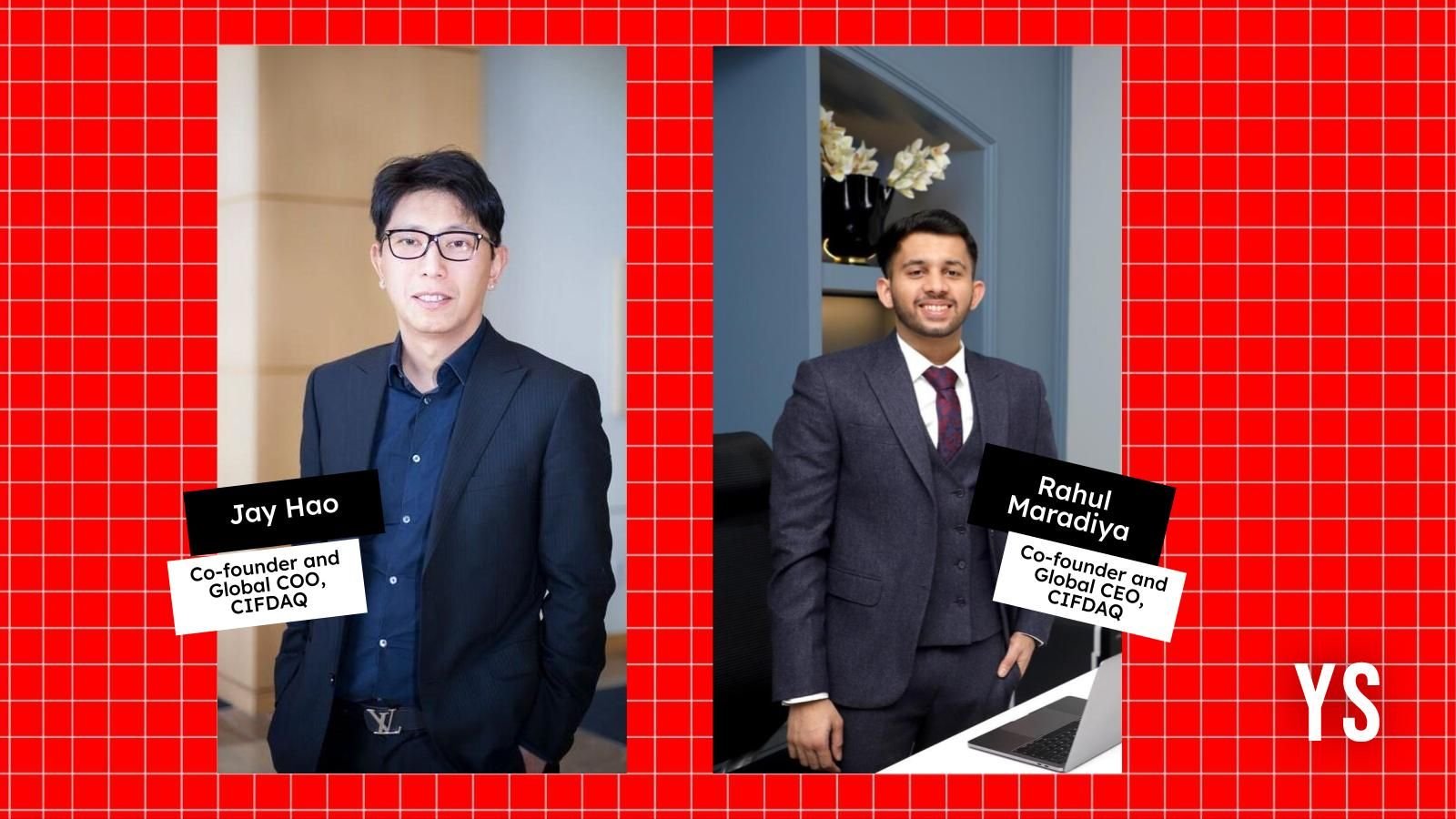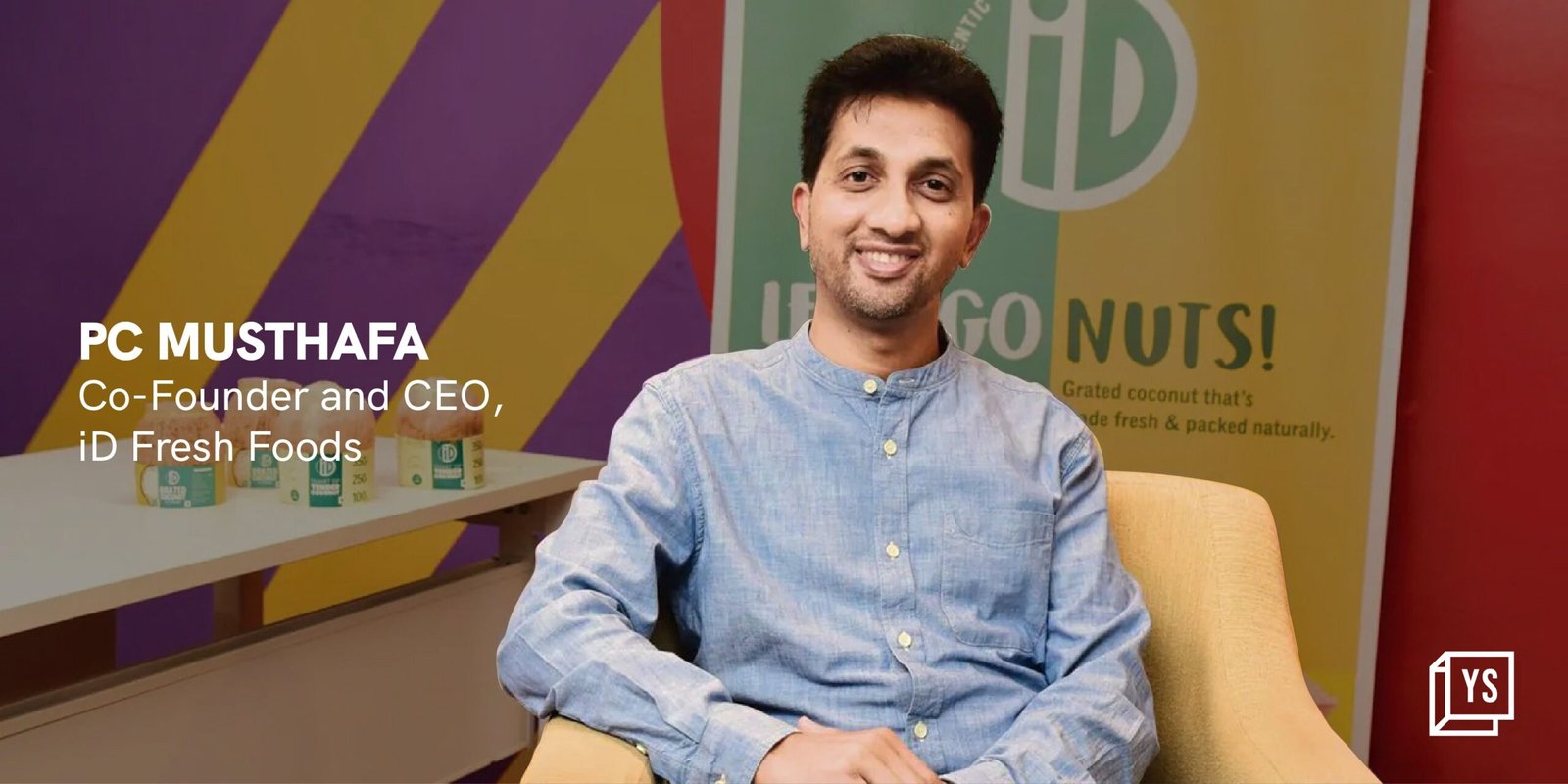Startup
Former OKX CEO Jay Hao joins Indian blockchain startup CIFDAQ as co-founder

Jay Hao, the former CEO of OKX, one of the largest cryptocurrency exchanges in the world, has joined CIFDAQ, a bootstrapped Indian blockchain startup as its co-founder and global COO.
In an exclusive interaction with YourStory, Hao throws light on CIFDAQ’s growth strategy as it plans to launch a centralised crypto exchange and a wallet next month.
He assures that CIFDAQ will implement robust safety measures and adopt the highest levels of cybersecurity across its operations. CIFDAQ will also build an ecosystem with financial prudence, he says.
A frugal approach, he adds, is fundamental to the company’s strategy for long-term profitability.
Hao joined OKX in 2018 when it had become the world’s largest cryptocurrency exchange by reported turnover. During his tenure, OKX entered India and United Arab Emirates and bolstered its presence in Latin America. The company also saw its largest trading volume in history under Hao.
Cybersecurity and user trust
One of the biggest challenges that crypto exchanges face today is that of security. With the crypto industry becoming a target of hacks and security breaches, CIFDAQ seeks to prioritise building a secure platform.
“We’re adopting the highest levels of cybersecurity,” Hao assures.
CIFDAQ is determined to implement robust safety measures across all facets of its operations. “We’re not just protecting wallets; we’re safeguarding the entire ecosystem,” he adds.
“History has shown that even giants can fade away, so it’s not about who enters first but how you differentiate and execute,” he notes.
Hao has been closely following the crypto heist that saw Indian crypto exchange WazirX knocking on the doors of Singapore’s bankrupcy court.
Hao acknowledges that, in the crypto industry, “pretty much everybody has experienced a hack.” However, he emphasises that a hack itself isn’t necessarily detrimental to the company. “It’s more about the trust you can uphold with your clients,” he points out.
Discussing the approach taken by some exchanges, Hao expresses disagreement over how WazirX handled the situation it was in. “I probably wouldn’t agree with what WazirX has done,” he says.
He strongly believes in prioritising user trust. “I’d rather give the money back to the users, instead of taking it from them.”
CIFDAQ’s growth strategy
Hao believes many exchanges rely too much on external funding without careful execution. “Talent and funding are crucial, but execution matters more,” he emphasises.
Hao is confident about CIFDAQ’s process-driven approach and its ability to be frugal with resources, which is key to outlasting competitors.
Hao explains that CIFDAQ is building an ecosystem with financial prudence. “We don’t waste money—we’re frugal and ensure every penny is used wisely,” he asserts.
This approach, he says, is fundamental to the company’s strategy for long-term profitability, particularly in developing markets such as Southeast Asia, Latin America, and Africa.
Hao is bullish on CIFDAQ’s potential to reach underbanked regions. While global exchanges like Binance have made inroads in Southeast Asia, many local exchanges lack the global resources to scale, he adds.
“I see a lot of potential in India and Southeast Asia. Our competitors might be global giants, but our real competition is ourselves.”
The company’s strategy includes acquiring licences from various jurisdictions to ensure compliance while expanding into emerging markets.
Hao plans to make gaming a key part of CIFDAQ’s blockchain ecosystem, as he views it as a natural fit for blockchain applications like NFTs and play-to-earn models. He envisions a platform where gamers can earn, trade, and own tokenised assets, creating a more immersive experience.
This approach would also enhance user engagement and drive wider adoption of CIFDAQ’s ecosystem, making gaming a major driver for the platform’s growth, he says.
Profitability and sustainability
CIFDAQ emphasises profitability and sustainability over growth at any cost.
“We’re not just building another financial platform; we are building an open blockchain solution that includes everything from gaming to stock trading across markets like the US, Japan, and Hong Kong,” says Hao.
CIFDAQ Blockchain Ecosystem Global Inc is a global blockchain ecosystem company offering advanced blockchain solutions, virtual digital asset exchange services, and tokenisation.
Mumbai-headquartered CIFDAQ, which was founded in 2020 by Rahul Maradiya, also has offices in Delhi, Bengaluru, and Kolkata.
Maradiya’s vision for CIFDAQ centres around building a sustainable, compliant blockchain ecosystem that caters to a diverse range of traders and markets. He emphasises the importance of simplicity, inclusiveness, and strong compliance.
“We want to obtain our own licences in every jurisdiction… even if it takes six months or a year,” he tells YourStory.
Maradiya highlights the need to avoid temporary solutions and focus on long-term stability. His approach involves scaling gradually while creating a platform with products for all types of traders.
“You can’t build a skyscraper and then have the floor crumble beneath you,” he says.
Startup
Andhra eyes Rs 10 lakh Cr investment in clean energy, net zero by 2047

Andhra Pradesh is eyeing a Rs 10 lakh crore investment in the clean energy sector in the state as it unveiled a new policy that incentivises investments across solar, wind and round-the-clock renewable energy projects to achieve net zero carbon emissions by 2047.
Andhra Pradesh Chief Minister N Chandrababu Naidu unveiled the AP Integrated Clean Energy (ICE) Policy that envisages incentives ranging from hassle-free land acquisition at reasonable price to power subsidy to certain sectors.
The ICE Policy will involve a proposed investment outlay of Rs 10 lakh crore, creating direct and indirect employment for 7,50,000 workers, the policy document said.
The policy looks to leverage the state’s vast renewable energy potential across wind, solar and hybrid sources, storage capabilities through pumped storage projects, a long coastline, six operational ports (with four under development) and skilled manpower availability as it pivots energy transition.
The Andhra Pradesh government is committed to promoting generation from renewables by creating a more conducive policy and investment framework to spur competition and private participation in the sector while maintaining a balance in the interests of all stakeholders, it said.
The police will aid in setting up projects that generate electricity from abundant sunlight and wind energy as well from pump-storage projects on water bodies.
Andhra Pradesh is targeting 78.5 gigawatts of solar capacity, 35 GW of wind energy, 22 GW of pumped storage and 1.5 million tonnes per annum of green hydrogen manufacturing capacity. It is also looking to set up 25 GWh of battery energy storage as well as projects to manufacture ethanol and biogas from biomass and 5,000 EV charging stations.
It is also looking at 25-30 GW of cleantech manufacturing that will create jobs for the local population.
To develop relevant skills in our workforce, the University for Green Energy and Circular Economy (UGC) will be established in collaboration with the government of India and industries under PPP (Public-Private Partnership) Mode, it said.
Clean Energy Knowledge & Skill Development Center (CEKSDC) will be formed to serve as a knowledge and training hub and enable partnerships with academia, think tanks, and industry.
The incentives in the policy include concessional land lease for all clean energy projects as well as renewable energy component manufacturing units. Stamp duty will be waived for mini-hydro, pump storage projects, battery storage, biofuels and manufacturing units while capital subsidies provided for battery storage, green hydrogen, biofuels and renewable energy manufacturing projects.
Electricity duty and other open access charges will be waived
Other incentives include a capital subsidy for electrolyser and biofuel projects, reimbursement of net state GST for 5 years, waiver of ED and reimbursement/waiver of intra-state transmission charges.
Capital subsidy of up to 25% is being offered for renewable energy manufacturing projects as also reimbursement of net state GST, off-take guarantee, and power subsidy of Re 1 per unit for 5-10 years.
New and Renewable Energy Development Corporation Of Andhra Pradesh (NREDCAP) will be the state nodal agency facilitating access to land parcels, and will support power power evacuation and open access, help in availing central government incentives, facilitate relevant approvals and clearances and support capacity allocation.
The policy will be operational for five years.
The ICE policy is in line with Andhra Pradesh’s ambitious target of net zero carbon emission by 2047, the document said, adding with renewed efforts under the policy, Andhra Pradesh will attract investment for the next 5 years, scaling up its renewable energy capacity multifold and claiming its rightful place as a leading state in the energy transition.
Startup
IPO-bound CIEL HR acquires Thomas Assessment, People Metrics to expand talent assessment portfolio

Human resources and staffing solutions firm CIEL HR Group has acquired Mumbai-based firms Thomas Assessment Private Limited and People Metrics Private Limited, which specialise in talent assessment.
These acquisitions enhance CIEL HR’s capabilities in the Indian talent assessment and development market while broadening its presence across the SAARC region, strengthening its geographic reach and service portfolio.
Thomas Assessment, backed by 43 years of global expertise, specialises in psychometric tools for behavioural, cognitive, personality, and emotional intelligence assessments, while People Metrics provides comprehensive assessment solutions.
“This (Thomas Assessment) is one important strategic acquisition which strengthens our presence in the assessment and development sector of the HR value chain. We also strengthen our talent assessment and development solutions and gain entry into the SAARC region, with Thomas,” said K Pandiarajan, Executive Chairperson and Director of CIEL Group, during a media briefing.
The Bengaluru-based firm has acquired a 51% stake in Thomas Assessment through an undisclosed cash and share swap deal, with plans to fully acquire the HR services company over the next 18 months, according to Pandiarajan.
“Since our inception, we have focused on elevating the standards of talent assessment and organisation development in India. I am excited to see us become a part of the CIEL HR Group taking our product suite to the large clientele of CIEL HR Group and unleashing our synergies,” said Sundara Rajan, Founder and Director of Thomas Assessments and People Metrics.
These two acquisitions follow the Bengaluru-based company’s purchase of another Mumbai-based upskilling startup Courseplay for $2 million in a mix of cash and share swap.
Before these acquisitions, the firm had bought Chennai-based IT staffing company Aargee Staffing Services in December 2023 and talent assessment company Jombay in December 2022.
CIEL HR Group, which is gearing up for an initial public offering (IPO) in the fourth quarter of the current fiscal year, is backed by prominent investors such as Sridhar Vembu of Zoho, CK Ranganathan of CavinKare, and NS Rajan, the former group Chief Human Resources Officer of Tata Group
The Bengaluru-based company clocked a consolidated revenue from operations of Rs 1,085 crore for FY24, up 36% from Rs 799 crore in the previous fiscal year. Additionally, its profit after tax for FY24 amounted to Rs 10.8 crore.
“We have been growing at around 40% over last year as of the six months of this past year. We are well on our way to meeting our commitments to the shareholders,” remarked Pandiarajan.
CIEL HR Group offers a comprehensive range of technology-driven human resources solutions that span the entire employee lifecycle, influencing all aspects of HR management. As of June 30, 2024, the company operates from 92 offices across 43 locations and has served 3,958 clients across various sectors.
Startup
iD Fresh turns profitable, clocks 16% rise in FY24 revenue

Packaged foods seller iD Fresh turned profitable in FY24, earning a net profit of Rs 4.56 crore against a loss of Rs 32.8 crore incurred in the previous fiscal year.
The company, which also sells idli and dosa batter as well as frozen food like parathas and chutneys, posted a 16.3% year-on-year (YoY) increase in its operating revenue to Rs 557.84 crore in FY24, compared with Rs 479.29 crore earned in the previous year, filings with the Registrar of Companies showed.
Improvements in the topline were matched by a rise in total expenses, which rose 8% YoY to Rs 558.2 crore in FY24. This was primarily due to rise in the cost of materials, employee benefits expenses, and other expenses including advertising costs.
The brand’s ready-to-cook batters, its largest segment, clocked a 24% YoY increase in sales to Rs 237 crore while the sales of its second-largest selling segment, parotta, increased by 10% YoY to Rs 183 crore.
Bengaluru-based iD Fresh recently announced the company’s foray into the spices market with the launch of three spice variants—red chilli powder, garam masala, and sambar powder.
It had earlier told YourStory about the company’s plans to expand its presence in north India where it does not have a strong hold yet, starting with Delhi and expanding to Chandigarh and Agra.
-

 Startup Stories1 year ago
Startup Stories1 year agoWhy Millennials, GenZs Are Riding The Investment Tech Wave In India
-

 Startup Stories1 year ago
Startup Stories1 year agoStartups That Caught Our Eyes In September 2023
-

 Startup Stories1 year ago
Startup Stories1 year agoHow Raaho Is Using Tech To Transform India’s Fragmented Commercial Trucking
-

 Startup Stories11 months ago
Startup Stories11 months agoMeet The 10 Indian Startup Gems In The Indian Jewellery Industry’s Crown
-

 Crptocurrency8 months ago
Crptocurrency8 months agoLither is Making Crypto Safe, Fun, and Profitable for Everyone!
-

 Startup Stories1 year ago
Startup Stories1 year agoHow Volt Money Is Unlocking The Value Of Mutual Funds With Secured Lending
-

 E-commerce1 year ago
E-commerce1 year agoTop Online Couponing Trends To Watch Out For In 2016
-

 Startup Stories1 year ago
Startup Stories1 year agoWhy Moscow-Based Kladana Considers Indian SME Sector As The Next Big Market For Cloud Computing




